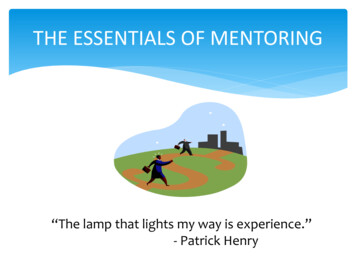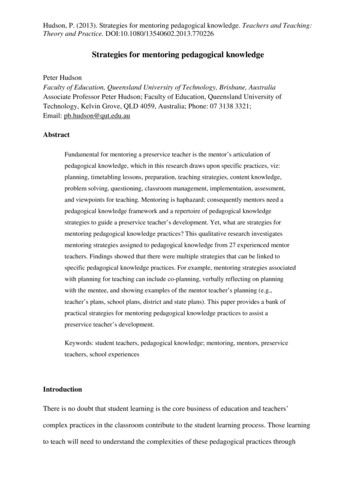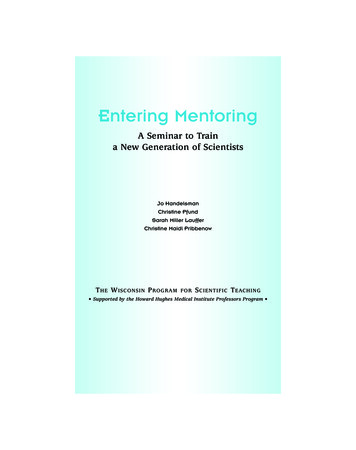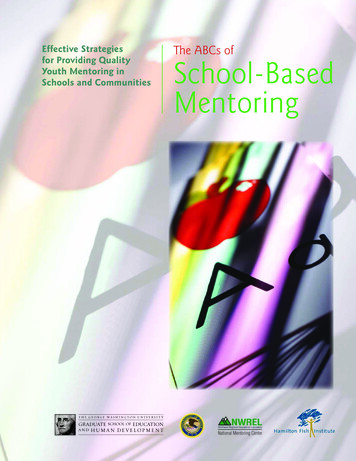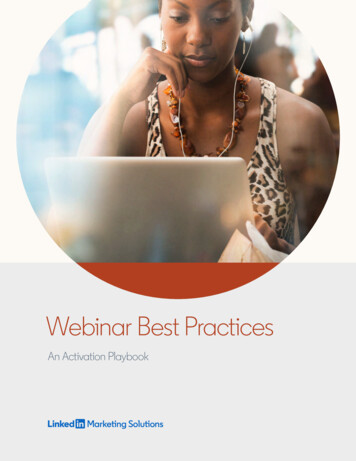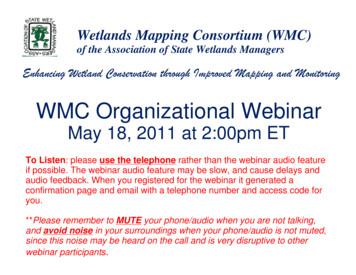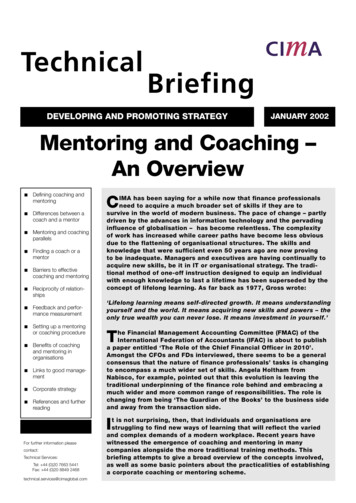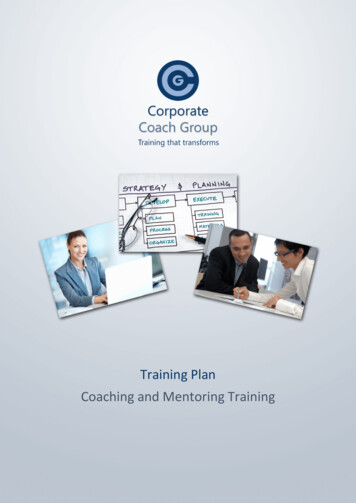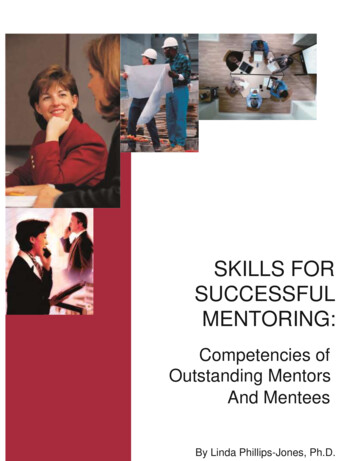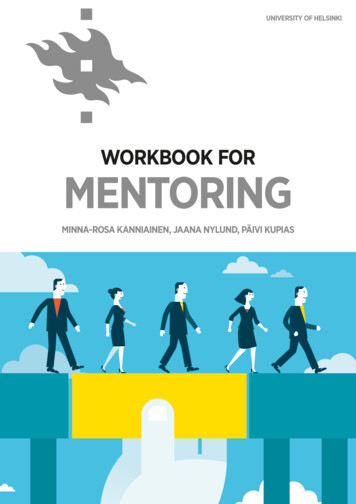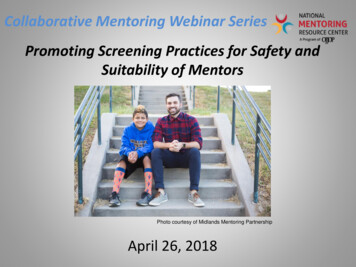
Transcription
Collaborative Mentoring Webinar SeriesPromoting Screening Practices for Safety andSuitability of MentorsPhoto courtesy of Midlands Mentoring PartnershipApril 26, 2018
2018 Collaborative Mentoring Webinar SeriesPlanning TeamThe Collaborative Mentoring Webinar Series is funded by the Office ofJuvenile Justice and Delinquency Prevention through the NationalMentoring Resource Center and facilitated in partnership with MENTOR:The National Mentoring PartnershipCollaborative Mentoring Webinar Series
Good to Know One week after the webinar, all attendees receive an email with: Instructions for how to access a PDF of presentation slides andwebinar recording Link to the Collaborative Mentoring Webinar Series webpage,where all slides, recordings and resources are postedPlease help us out by answering survey questions at the end of thewebinar.Collaborative Mentoring Webinar Series
Participate in Today’s Webinar All attendees muted for best soundType questions and comments inthe question boxRespond to pollsWho is with us today?Collaborative Mentoring Webinar Series
Today’s Webinar Brian Sales, MENTOR: The National MentoringPartnership Unique Saunders, MENTOR IndependenceRegion Ju’Riese Colon and Perry Cooper, Boys & GirlsClubs of America Joellen Malstrom, Cal Ripken Sr. FoundationQ & A throughout the presentation(use the Q & A panel)Collaborative Mentoring Webinar Series
Brian Sales Director of Training andTechnical Assistance atMENTOR Over 25 years of youthdevelopment experiencein a variety of settings Has trained hundreds ofvolunteer mentors andstaff in youthdevelopment principlesand youth mentoringCollaborative Mentoring Webinar Series
Unique Saunders Manager of TechnicalAssistance & Quality forMENTOR IndependenceRegion in Philadelphia, PA Oversees MENTOR IR’stechnical assistance andNational QualityMentoring Systems efforts Developed an afterschoolprogram empoweringyoung girls Serves as a mentor bothformally and informallyCollaborative Mentoring Webinar Series
Boys & Girls Clubs of AmericaJu’Riese ColonNational Vice PresidentChild & Club SafetyPerry CooperNational Vice PresidentFederal GrantsCollaborative Mentoring Webinar Series
Joellen Malstrom Joined the Cal Ripken Sr.Foundation in 2008 Serves at the VP ofHuman Resources andOperations Has more than 20 yearsof progressive HumanResources experience Helped to create theFoundation’scomprehensive ChildProtection ProgramCollaborative Mentoring Webinar Series
Screening for Safety Screening for Safety– Identifies individuals who would create anunacceptable risk if given unsupervised access toyouth– Prevents placement of individuals who lack thetime, judgment, or necessary skills and attitudes– Reduces liability– Rules out potentially dangerous individuals with ahistory of violent or exploitative behaviorCollaborative Mentoring Webinar Series
Screening for Suitability Screening for Suitability– Ensures mentees and mentors are a good fit foryour program and goals– Gauges the commitment level of the mentor, thementee, and the mentee’s family– Allows you to determine whether participants areappropriate for your program based on youreligibility criteriaCollaborative Mentoring Webinar Series
Behavior Based Interviews Look for four key traits in a prospective mentor:– Dependable (keeps commitments, shows up on time,follows through)– Adaptable (shows the ability to overcome adversity inhis or her personal and/or professional life)– Respectful (adheres to program and family rules,interested in learning about the experiences of others,nonjudgmental)– Resilient (can handle common youth “testingbehaviors” and is not particularly “rejectionsensitive”)Collaborative Mentoring Webinar Series
Red Flags Be mindful of four red flags when screeningprospective mentors:– Under-involvement with adults and over-involvementwith children– History of being abused, neglected, or sexuallyvictimized– Criminal record, even if seemingly unrelated to crimesagainst children– Applied—but was not accepted—at or “didn’t like”other local youth-serving programs Source: ( Becky Cooper, SAFEMentoring)Collaborative Mentoring Webinar Series
Myths about background checks All background checks are the same– Finger print– Social Security One background check is enough National checks are the best State checks are not as rigorousCollaborative Mentoring Webinar Series
Research Spencer, Keller and Pryce’s research on qualitiesthat mentors need in successful matches– High level of attunement in their personalrelationships– Realistic expectations about the relationship, theexperience and impact they can have on youth– Ability to problem solve and seek support from theprogram to overcome difficulties– Youth Centered focus– Awareness of personal biasCollaborative Mentoring Webinar Series
Elements of Effective Practice Six Core Standardsof Practice Program Planningand ManagementCollaborative Mentoring Webinar Series
Screening BenchmarksBenchmarks for Mentors:B.2.1 Program has established criteria for accepting mentors into the program aswell as criteria for disqualifying mentor applicants.B.2.2 Prospective mentors complete a written application that includes questionsdesigned to help assess their safety and suitability for mentoring a youth.B.2.3 Program conducts at least one face-to-face interview with each prospectivementor that includes questions designed to help the program assess his or hersuitability for mentoring a youth.B.2.4 Program conducts a comprehensive criminal background check onprospective adult mentors, including searching a national criminal recordsdatabase, along with sex offender and child abuse registries and, when relevant,driving records.Collaborative Mentoring Webinar Series
Screening Benchmarks Cont’dB.2.5 Program conducts reference check interviews with multiple adults whoknow an applicant (ideally, both personal and professional references) thatinclude questions to help assess his or her suitability for mentoring a youth.B.2.6 Prospective mentors agree in writing to a one-year (calendar or school)minimum commitment for the mentoring relationship, or a minimum timecommitment that is required by the mentoring program.B.2.7 Prospective mentors agree in writing to participate in face-to-facemeetings with their mentees that average a minimum of once a week and atotal of four or more hours per month over the course of the relationship, or ata minimum frequency and amount of hours that are required by theirmentoring program.Collaborative Mentoring Webinar Series
Screening Benchmarks Cont’dBenchmarks for Mentees and Parents/GuardiansB.2.8 Program has established criteria for accepting youth into the program as well ascriteria that would disqualify a potential youth participant.B.2.9 Parent(s)/guardian(s) complete an application or referral form.B.2.10 Parent(s)/guardian(s) provide informed permission for their child to participate.B.2.11 Parent(s)/guardian(s) and mentees agree in writing to a one-year (calendar orschool) minimum commitment for the mentoring relationship, or the minimum timecommitment that is required by the mentoring program.B.2.12 Parents(s)/guardian(s) and mentees agree in writing that mentees participate inface-to-face meetings with their mentors that average a minimum of once a week and atotal of four or more hours per month over the course of the relationship, or at aminimum frequency and amount of hours that are required by the mentoring programCollaborative Mentoring Webinar Series
Screening EnhancementsE.2.1 Program utilizes national, fingerprint-based FBI criminal backgroundchecks.E.2.2 Program conducts at least one home visit of each prospective mentor,especially when the match may be meeting in the mentor’s home.E.2.3 Program conducts comprehensive criminal background checks on alladults living in the home of prospective mentors, including searches of anational criminal records database along with sex offender and child abuseregistries, when the match may meet in mentors’ homes.E.2.4 School-based programs assess mentors’ interest in maintaining contactwith their mentees during the summer months (following the close of theacademic school year) and offer assistance to matches in maintaining contact.Collaborative Mentoring Webinar Series
Screening Enhancements Cont’dE.2.5 Programs that utilize adult mentors prioritize acceptingmentor applicants who are older than college-age.E.2.6 Program uses evidence-based screening tools andpractices to identify individuals who have attitudes and beliefsthat support safe and effective mentoring relationshipE.2.7 Mentees complete an application (either written orverbally).E.2.8 Mentees provide written assent agreeing to participatein their mentoring program.Collaborative Mentoring Webinar Series
The Screening ProcessStep 1: Orientation SessionStep 2: Application PacketStep 3: Formal Interview and Reference ChecksStep 4: Criminal History Record ChecksStep 5: Interpreting the Results of Record ChecksStep 6: Additional Screening MechanismsStep 7: Pre-Match Training and Moving Toward the MatchStep 8: Match SupervisionCollaborative Mentoring Webinar Series
BGCA Screening Process Screening under the federated modelMembership requirements and standardsPotential loopholes in background checksRecommended hiring practices– Reference checks– Behavior based and panel interviewing– Screening renewalsCollaborative Mentoring Webinar Series
Background Checks, Safety & Suitability Member in Good Standing BGCA Compliant with BackgroundCheck Membership Requirements Site-Based Requirement/LOA Requirement/Training & MentorOrientation Materials Collect and Maintain Mentoring Case Management Forms––––Mentor ApplicationFitness Determination FormYouth Application for Mentoring & Parental Consent FormMentee Risk Profile Form The Mentor Application Process (Safety & plete ApplicationComplete Fitness Determination Form (Background Check)Complete Mentor TrainingReview Mentoring Rules and Guidelines - All mentoring must take place on siteCollaborative Mentoring Webinar Series
Mentoring Fitness Determination FormCollaborative Mentoring Webinar Series
Mentee Risk Profile FormCollaborative Mentoring Webinar Series
Child Protection: Keeping All Kids Safe National Child Protection ToolkitDesigned for youth-serving organizations to keep childrensafe from sexual predators and those who seek to harm them.The first-of-its-kind resource includes our newly developedChild Protection Policy, affordable background checks, andchild safety training programs, available to any organization inAmerica at no cost to all who register online. Model Child Protection Policy, gold standard policy, easilyadaptable for any organization serving youth Affordable & Effective National Criminal BackgroundChecks Online Child Protection Training Portal, including credible,substantive training videosCollaborative Mentoring Webinar Series
Child Protection: Keeping All Kids Safe Policy Template and Reporting Procedures A strong policy is the first step in protecting both thechildren and the organization itself, and mostorganizations fail in this area. Gold Standard Template can be easily adapted to anyorganization. Zero Tolerance Policy Compliance Reporting FormCollaborative Mentoring Webinar Series
Child Protection: Keeping All Kids Safe Affordable Background Checks Recognizing that background checks can be costprohibitive, the Foundation has partnered with FirstAdvantage to ensure that our partners and affiliateshave the ability to access comprehensive backgroundchecks at an affordable price. Felony and Misdemeanor, Registered sex offenderrecord information, National Criminal File: Red light, Yellow light, Green Light scoringCollaborative Mentoring Webinar Series
Child Protection: Keeping All Kids Safe Training Series Sexual Predators and How They Operate Building Blocks of a Child Protection Plan Background Screening Education is Key to Prevention Proper Response and Reporting ive Mentoring Webinar Series
Q&AType your questions in thequestion box:Collaborative Mentoring Webinar Series
Additional Resources Elements of Effective Practice for Mentoring SAFE (Screening Applicants for Effectiveness) by Friends forYouth: Cooper, Arévalo, and Smith, through safementoring.com. Starting a Youth Mentoring Program modules, through the NMRC Corporation for National and Community Service’s education/mentoringtraining-tools-0#staff U.S. Department of Education’s Mentoring Program’s Guide toScreening and Background /files/resources/screening.pdf Information about accessing background checks through the CalRipken, Sr. Foundation and First Advantage partnership Access the Cal Ripken, Sr. Foundation’s National Child ProtectionTool KitCollaborative Mentoring Webinar Series
The Child Protection Improvements Act (CPIA) CPIA was signed into law on March 23! Purpose: provide universal access to FBIfingerprint background checks to orgs servingchildren, individuals with disabilities, and seniors CPIA is not a mandate CPIA will take approximately 1 year to set upbefore programs can benefit CPIA will offer low-cost fingerprint checks andswift turn-around of screening results Contact Abbie Evans, Senior Director ofGovernment Relations, at aevans@mentoring.orgCollaborative Mentoring Webinar Series
Additional ResourcesAffiliatesAffiliates serve as a clearinghouse for training, resources, public awareness andadvocacy. Find your local affiliate here: ntoring ConnectorRecruit mentors by submitting your program to the Mentoring al Mentoring Resource CenterCheck out the OJJDP National Mentoring Resource Center for no-cost evidencebased mentoring resourcesCollaborative Mentoring Webinar Series
Remember After the webinar: Please help us out by answering survey questions atthe end of the webinar. Everyone will get an email with information on how todownload the slides, recording, and resources on theCMWS webpage on the MENTOR website:http://www.mentoring.org/program resources/training opportunities/collaborative mentoring webinar series/Collaborative Mentoring Webinar Series
Stay Connected Email us at collaborativewebinarseries@mentoring.org Tweet with hashtag #MentoringWebinar Visit our webpage on the MENTOR website for past and upcoming webinars:Collaborative Mentoring Webinar Series
Join Us Next Month!Ongoing TrainingMay 17, 20181 - 2:15 pm EasternCollaborative Mentoring Webinar Series
Collaborative Mentoring Webinar Series Screening Benchmarks Cont'd B.2.5 Program conducts reference check interviews with multiple adults who know an applicant (ideally, both personal and professional references) that include questions to help assess his or her suitability for mentoring a youth.
